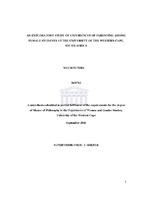| dc.description.abstract | Advancement in education has ensured that there is parity in terms of enrolment for both females and males at tertiary institutions. However, women students continue to face challenges to advancing in education. Given that South African society remains highly gendered and that universities are historically male-dominated sites that do not necessarily cater for the particular needs of women (or children), one area of challenge may relate to having to balance parenting roles with the demands of being a student. For example, at the University of the Western Cape (UWC), students with children are prohibited from access to the residences, leaving them with no option but to seek alternative accommodation, where they can remain with their babies or look for childcare support from their relatives. While there is a growing body of work on the experiences of school-going pregnant and parenting learners, there is little work in the South African context of the experiences of women who are both parents and students at tertiary institutions. Since the national education system clearly supports and encourages life-long learning, an investigation into the conditions and experiences of learning for parenting students is important. The focus on women students was motivated by existing findings that show how normative gender roles persist and that women continue to be viewed as the primary nurturers with respect to the care of children. The purpose of this study was to explore the experiences of motherhood among young female students at UWC. The study was situated within a feminist social constructionist framework and a feminist qualitative methodology was employed. Two or more interviews were conducted with a group of eight participants, selected by convenient sampling, and aged between 18 and 30 years, each with a child or children under the age of five years. Interviews were conducted at the participants choice of location and at a time that was convenient to them. All interviews were audio-recorded and the tapes were kept safely in the researchers home. All standard ethical procedures for research with human subjects were followed. Data was transcribed verbatim and a qualitative thematic analysis was conducted. Key themes were elucidated and data presented thematically. The key challenges cited included time management, self motivation and the social demands of being a mother. These tend to have adverse repercussions on academic excellence. The analysis revealed that though the young women are allowed to return to universities after becoming mothers, they face many challenges in trying to balance motherhood and the demands of schooling. Furthermore, the findings highlight the tension and ambivalence experienced by participants as they negotiate the social and cultural expectations of motherhood and their personal reality, in meeting the demands of motherhood as student mothers. In their struggle to meet the social and cultural expectations of motherhood, they placed tremendous emotional and physical stress upon themselves which manifested as guilt, physical exhaustion, psychological stress, physical illness and the desire to leave studies notwithstanding the value they attached to it. Although the participants challenged these expectations in various ways, the underlying nuances when they recounted their experiences, remain embedded in these societal and cultural expectations. However, in voicing their experiences, it was clear that they were not always simply accepting the status quo but at times challenging it, and thereby deconstructing the myths of motherhood that are so salient in current social and cultural contexts. The study also found that student mothers at UWC, at least on the basis of this small sample - do not appear to receive sufficient support on campus (physically, materially and emotionally). The study concludes that this group of student mothers face serious challenges as mothers and students and, further, that these challenges are exacerbated by the continued social expectations of women to be perfect mothers which, together with the material gender inequalities in sharing parenting care, could impede effective academic studies. The study recommends that universities play a stronger role in alleviating the challenges for such students. In addition, it recommends that more research be conducted in the area, possibly longitudinal studies, as well as studies that may be more generalisable. | en_US |

